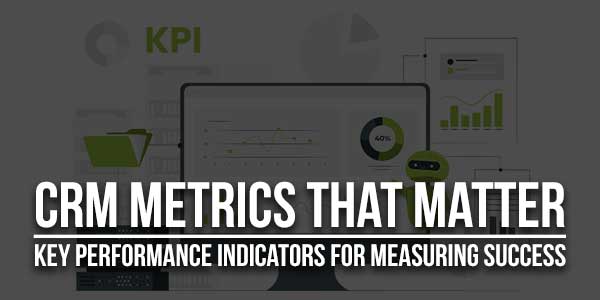
Welcome to the world of CRM metrics that matter. In a data-driven business landscape, the ability to pinpoint the key performance indicators (KPIs) that truly impact your customer relationship management strategies is crucial. These metrics serve as your compass, guiding decisions, optimizing processes, and ultimately driving success. In this exploration, we’ll examine the vital CRM metrics that can transform the way you engage with customers, improve efficiency, and steer your business toward growth and profitability.
Table of Contents
Customer Acquisition Metrics:
Customer acquisition stats are one of the main CRM metrics that matter. These statistics provide valuable insights into how effectively a company is attracting new clients. Lead conversion rate, a critical KPI, measures the percentage of leads that become paying clients. A lower cost per acquisition (CPA) means more efficient spending on marketing campaigns, making it essential for optimizing budgets. Calculating the customer lifetime value (CLV) also helps gauge the long-term revenue potential of each customer, steering marketing efforts toward high-value segments. Meanwhile, the customer acquisition cost (CAC) assesses the cost-effectiveness of acquiring new clients. Tracking these stats both aids in cost management and helps in identifying areas for improvement in the client acquisition process.
Customer Retention Metrics:
Customer retention metrics are important in any business’s growth strategy, aiming to maximize customer lifetime value. One crucial metric is the churn rate, which measures the percentage of clients who stop using a product or service within a specific period. A low churn rate signifies a healthy client base. Additionally, the client retention rate reveals how successful a company is in keeping its existing patrons. The repeat purchase rate showcases how often people return for more, highlighting brand loyalty.
Furthermore, the Net Promoter Score (NPS) measures client satisfaction and willingness to recommend your business to others. By diligently monitoring these statistics, companies can identify areas that need improvement, tailor marketing efforts, and create strategies to foster loyalty. This both retains valuable clients and enhances the overall profitability and sustainability of the business.
Sales Team Performance Metrics
Sales team performance metrics are a great way to improve your business approach. They provide actionable insight into the effectiveness of your sales efforts. The sales conversion rate measures the percentage of leads that turn into successful sales, allowing you to gauge your team’s efficiency in closing deals. Analyzing the average deal size also provides insights into the value of your transactions, which helps in optimizing pricing strategies. Furthermore, sales velocity indicates how quickly deals progress through the sales pipeline, enabling you to identify bottlenecks. In addition to that, the win-loss ratio offers crucial feedback on your team’s competitiveness in the market. Tracking these metrics helps you pinpoint areas for improvement, set realistic goals, and ultimately enhance your business approach.
Customer Service Metrics:
Customer service metrics are necessary to remain competitive in the market. They offer valuable insights into how effectively your support team interacts with clients. First, response time, a critical statistic, measures how quickly your team addresses inquiries or issues. A shorter response time often leads to higher satisfaction. Customer satisfaction (CSAT) and customer effort score (CES) provide direct feedback, helping you gauge client happiness.
Meanwhile, tracking the average resolution time can help identify areas for process improvement within your customer service workflow. These stats are both indicators of performance and tools to enhance the overall customer experience. Focusing on these key metrics can help businesses build stronger customer relationships, foster loyalty, and drive sustainable growth.
div

Marketing Metrics:
Marketing metrics are always numbered among the CRM metrics that matter. They provide essential insights into the effectiveness of your campaigns. Marketing qualified leads (MQLs) help identify leads most likely to convert into customers, streamlining your sales efforts. Meanwhile, the customer engagement score measures the level of interaction between your brand and its audience, offering insights into campaign resonance. Email open and click-through rates gauge the performance of your email marketing campaigns, indicating whether your messages resonate with recipients.
Additionally, the website conversion rate measures how well your site turns visitors into leads or customers, a fundamental aspect of online success. By diligently tracking these, you can fine-tune your marketing strategy, allocate resources effectively, and ensure that your efforts align with your business goals. Ultimately, marketing metrics empower you to make data-driven decisions, improving the overall impact and efficiency of your marketing efforts.
CRM System Metrics:
CRM system metrics offer insights into how well your platform serves your business needs. The CRM adoption rate, for example, measures the extent to which your team embraces the system, ensuring that your investment is being utilized effectively. Data accuracy and completeness ensure that the information stored in your CRM is reliable and comprehensive, allowing for more informed decision-making. User activity and engagement reflect how actively your team uses the CRM, which can indicate its effectiveness and usefulness. Finally, monitoring CRM downtime and reliability helps ensure that your system is available when needed, minimizing disruptions.
Integration Of CRM Metrics:
Integrating CRM metrics that matter is the key to unlocking the full potential of your customer relationship management efforts. When you seamlessly integrate various CRM metrics into a unified dashboard, you create a comprehensive view of your customer interactions and business performance. This holistic approach lets you identify correlations and patterns that individual stats may not reveal. Monitor these statistics in real-time, and you can gain the agility to make quick, informed decisions and adapt your strategies promptly. Integrating CRM statistics isn’t just about data consolidation either, since it’s about leveraging these insights to refine your customer engagement strategies, enhance efficiency, and ultimately achieve better business outcomes.
Challenges And Pitfalls:
Navigating the world of CRM statistics comes with its fair share of challenges and pitfalls. Common CRM stat measurement mistakes, such as vanity metrics, can lead to misguided decision-making. Ensuring data quality is another hurdle, as inaccurate or incomplete data can skew results. Over-reliance on stats alone, without considering the broader context, can also misguide strategies. Moreover, the need to comply with data privacy regulations adds complexity. These challenges highlight the importance of a well-rounded approach, including training teams and investing in technology. By addressing these pitfalls, businesses can unlock the true potential of CRM, leveraging data for more effective decision-making.
CRM Metrics That Matter For A Confident Business Growth:
With what we covered on the CRM metrics that matter, remember that these metrics are more than just numbers. They are the pulse of your customer relationships, guiding your efforts to deliver exceptional experiences, nurture loyalty, and achieve sustainable growth. Continually monitoring and optimizing these vital statistics empowers your business to stay agile, responsive, and customer-centric in an ever-evolving marketplace. So, keep measuring, keep improving, and let these stats drive your path to success!

















Be the first to write a comment.